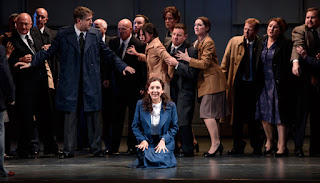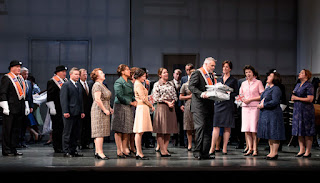 |
| Rosa Feola - Bellini I Puritani Welsh National Opera - photo Bill Cooper |
Reviewed by Robert Hugill on Oct 4 2015
Star rating:
Gripping musical theatre in this time-slip account of Bellini's last opera
Vividly gripping drama is perhaps not phrase which you might expect to be used to refer to Bellini's I Puritani, but that was the phrase which came into my mind after seen Annilese Miskimmon's new production of the opera, presented by Welsh National Opera at the Wales Millennium Centre on Sunday 4 October 2015. Carlo Rizzi conducted, with designs by Leslie Travers, lighting by Mark Jonathan and choreography by Kally Lloyd Jones. Rosa Feola was Elvira, Barry Banks was Arturo, with David Kempster as Riccardo, Wojtek Gierlach as Giorgio, Simon Crosby Buttle as Bruno, Aidan Smith as Gualtiero and Sian Meinir as Enrichetta.
 |
| Rosa Feola and ensemble - Bellini I Puritani Welsh National Opera - photo Bill Cooper |
 |
| Wojtek Gierlach, David Kempster & ensemble - Bellini I Puritani Welsh National Opera - photo Bill Cooper |
 |
| Rosa Feola and Barry Banks - Bellini I Puritani Welsh National Opera - photo Bill Cooper |
It helped of course that this dramatic intelligence was partnered by a superbly musical performance from the cast. Rosa Feola, making her debut with Welsh National Opera, was coruscating as Elvira. Feola seems to have sung mainly coloratura/lyric roles but here combined a fluency in the coloratura with a great sense of strength. Not quite a spinto performance, but something in that direction; this Elvira was no demented canary, and Feola made Elvira's madness truly a reality whilst giving us a superb series of fioriture and roulades, and a stunning sense of line. Technically adept, she folded the ornamental elaborations into the very fabric of the vocal line as Bellini intended and brought a scary intensity to the whole performance.
 |
| David Kempster & ensemble - Bellini I Puritani Welsh National Opera - photo Bill Cooper |
Wojtek Gierlach was a younger than usual Giorgio, made a Protestant minister in the 1960's which makes sense of his calmer, more rational point of view. Gierlach had a nice way round Bellini's lines and contributed superbly to the various ensembles and duets which he was part of, thrilling at the right moments and intelligently supportive at other. David Kempster was frighteningly intense as Riccardo, both in the 20th and the 17th centuries, combining this with a lovely feel for Bellini's lines. Gierlach and Kempster's duet at the end of Act Two was rightly thrilling musically and balanced Miskimmon's introduction of the Orange lodge march brilliantly.
The smaller roles were all well taken, with Simon Crosby Buttle as Bruno, Aidan Smith as Gualtiero and Sian Meinir as Enrichetta. They and the chorus brought a frightening intensity to the 20th century scenes and made the 17th century Protestants scarily serious and accusing.
In the pit, the WNO Orchestra played superbly as ever for Carlo Rizzi, a former musical director of the company. Rizzi showed great sympathy with Bellini's music, but the sympathy and space for the singers never degenerated into self-indulgence. The orchestral contribution was as taut and as fluid as the drama on stage.
This performance was a notable achievement for WNO and all concerned, bringing a new sense of drama into Bellini's opera but never losing the essential quality of the music. This always sounded like Bellini, with a superb sense of line and fine ornamentation. It helped that Miskimmon had a clear sense of what is, and is not, possible in updating an opera. Whilst the 20th century scenes were firmly realistic and almost naturalistic, Miskimmon always made room for the singers and the extra action never pulled focus from the music drama. At all the key moments, we were free to concentrate on what counted, the musical performance.
This review also appears on OperaToday.com
Elsewhere on this blog:
- Serious Drama: Handel's Orlando in Cardiff - opera review
- Hear the message: Bob Chilcott's The Angry Planet - CD review
- The lute song re-invented: Amores Pasados, from John Potter, Anna Maria Friman, Jacob Heringman and Ariel Abramovich - Cd review
- Through a romantic lens: Hideko Udagawa in baroque repertoire - Cd review
- Festival finale: King's College Choir & Stephen Cleobury in Mozart's Requiem at Hatfield House - concert review
- On Thrilling Form: English National Opera in Lady Macbeth of Mtsensek - opera review
- London International A Cappella Choir Competition: Heat 2 at St John's Smith Square - concert review
- New orchestra, new concert hall: I chat to Laurence Equilbey about Accentus, Insula and La Cité musicale départementale de l'Ile de Seguin - interview
- Red Note Ensemble: Entangled Fortunes, music of John McLeod - CD review
- Post-Freudian opera: Pierre Bartholomee's Oedipe sur la route - Cd review
- Celebrating 10 years: Stile Antico - Cd review
- Intimate and inward: Mahler songs from Anne Schwanewilms - CD review
- Remarkable engagement between artist and role: Juan Diego Florez in Gluck's Orphee et Eurydic - Opera review
- Building on the Schubert Project: My encounter with Oxford Lieder Festival founder Sholto Kynoch - interview
- Virtuoso drama: Pergolesi's Adriano in Siria from Opera Settecento - opera review
- Engaging discovery: Salieri's Trofonio's Cave from Bampton Classical Opera - opera review
- Home











No comments:
Post a Comment